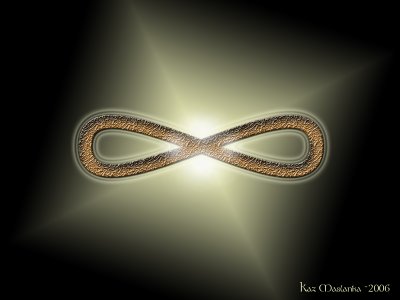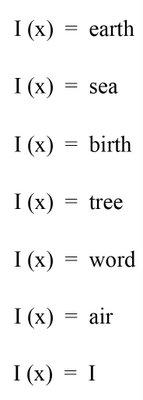The History Of Numbers

Karl Kempton sent me this link ... all I could say was WOW!
check out all these books (click here)

Karl Kempton sent me this link ... all I could say was WOW!
check out all these books (click here)
Posted by
Kaz Maslanka
at
12:07 AM
0
comments
![]()

I tend to think that without logic, you cannot communicate and without communication, you cannot have a philosophy. To me logic presupposes philosophy ... Logic is the supportive structure for thought without it everything would fall apart, no one could predict where our next meal would come from, much less anything else. The other side of the coin is that without a philosophy coloring ones theory of logic, ones logic has no starting point. In this sense, ones logic can have no logic without a philosophical stone to stand on. It is a vicious circle!
The clipping below originally came from a polytope list and was sent to me by my friend the mathematician Paul Gailiunas. My original question to him a few weeks ago concerned the importance of infinity within modern scientific equations. Math poets seem to gravitate toward using infinity in our math poems and as professor Gailiunas told me scientists tend to avoid infinity as much as they can. The following is an example of scientific thinking in this area.
Kaz,
This came from a completely different direction.
I thought you might beinterested.
Paul
On Thu 7 Sep 2006 (21:46:48 +0100), guy@steelpillow.com wrote:On Wed, 6 Sep 2006 08:54:09, "Wenninger, Magnus"
Posted by
Kaz Maslanka
at
11:09 AM
0
comments
![]()

My friend Keith Rowley pointed me at the equation above by 19th century American Mathematician George David Birkhoff. The equation comes from Birkhoff’s 1933 book entitled “Aesthetic Measure”. Here is a perfect example of an equation intended for artistic purpose and yet denotative. Here Birkhoff intends to write an equation to measure levels of aesthetic based on a ratio of order and complexity. Personally, I feel trying to quantify something as broad as the word ‘aesthetic’ is extremely difficult and elusive. I have not read his book so I withhold more comment until I have read what he has to say. My intuition tells me what he is doing is much like my syncopation theory. It will be interesting to see what differences there are.
Posted by
Kaz Maslanka
at
10:22 PM
1 comments
![]()

Posted by
Kaz Maslanka
at
11:15 AM
0
comments
![]()

i
am a
quotient of the
sun
i am
a quotient of
the
moon i
am a quotient
of
the one
i am a
quotient
of the
two i am
a
quotient of
the burn i
am
a quotient
of the dew
2.
i
am a
multiple of the
earth
i am
a multiple of
the
sea i
am a multiple
of
the birth
i am a
multiple
of the
tree i am
a
multiple of
the word i
am
a multiple
of the air
3.
i
subtract myself
from you for
luck
i add
myself to you
for
love i
subtract myself from
you
for luck
i add myself
to
you for
love i subtract
myself
from you
for luck i
add
myself to
you for love
4.
i
am zero
over you +
1
i am
zero over you
+
2 minus
0 over you
+
1 minus
0 over you
plus
2 minus
you over me
+
0 minus
1 over you
The poem above is a poem by Scott Glassman called factorial taken from his blog.
I find this poem of Scott Glassman very interesting in that I can see it as an example of mathematical poetry buried inside mathematics poetry. (Click here for the difference between mathematical poetry, mathematics poetry and mathematical visual poetry) The first section of Scott’s poem I have transformed into a piece of mathematical visual poetry. (above) This mathematical visual poem shows four separate mathematical poems that are contained within section one of his mathematics poem.
The verses in the second section have different meanings dependent on whether the poem is lineated or written without lineation. However, both ideas are present in the poem. You can feel the tension between differing statements and the shift in context between the statements due to reading it lineated and then reading it not lineated. I have written out all the mathematical poems/verses I could find contained within this section and displayed them in the image shown above.
The third section functions much the same as the second as far as tension between lineation and reading it without the lineation. However this section has only two statements repeated three times. The interesting part in this section is that the lineation creates two more mathematical poems which are shown in black (above).
The fourth section is a bit more difficult to map out. Therefore I shot a photo of my deductions from the poem. (above) You can see the brackets point to three mathematical poems that are delineated by the brackets inside the mathematics poem. The third one of the three I used algebra to simplify the expression into a compact form/context. Watch the meaning change in this poem through all the metamorphoses.
Posted by
Kaz Maslanka
at
10:42 PM
2
comments
![]()
This page is reserved for Geof Huth's Mathematical Poems and related material
Algebraic Poem #1
Algebraic Poem #2
Algebraic Poem #3
Algebraic Poem #4
Mathematical Graffiti
Posted by
Kaz Maslanka
at
11:12 PM
0
comments
![]()
Labels: Geof Huth


Posted by
Kaz Maslanka
at
2:37 PM
0
comments
![]()
Here is a timely mathematics poem by JoAnne Growny:
Perelman and Me
On Tuesday, August 22, 2006 Russian mathematician Grigory Perelman declined the Fields Medal for his contribution to the proof of a well-known and difficult conjecture first posed by Henri Poincare in 1904. I applaud Perelman’s seclusion.
The gravity of the universe
requires dark matter.
Choosing one thought
prevents another.
Little girls learn social graces
to make others feel at ease.
But friendly greetings
are never mathematics.
Difficult thoughts
are born in isolation :
genius slips away if socialized—
and so he must refuse the prize.
JoAnne Growney
25 August 2006
Posted by
Kaz Maslanka
at
1:31 PM
0
comments
![]()

Bob Grumman has just posted Marko Niemi’s translation of Friedrich Schlegel’s equation for poetry and God on his blog at this URL: click here
Bob has made the following comments:
“This is a translation by Marko Niemi of the 19th-Century German philosopher Friedrich Schlegel’s formula for poetry. Kaz thinks it may be the world's first mathematical poem. I'm not sure. It seems mostly informrature to me--i.e., intended to inform rather than provide beauty, as literature is intended to do (in my poetics). It is a way of mathematically defining something philosophical as e equals mc squared mathematically defines energy, rather than creating a poetic experience. It is entirely asensual--at least for one like me, who has no notion what material feature "God" has. Mathematically, it is a little silly, too--for if "shit" were substituted for "FSM," the equation would be in no way altered. On the other hand, it is a marvelously step toward what Kaz and I and Geof and Karl are doing, perhaps a pivotal one (although I don't know of anyone who was inspired to create mathematical poetry by it).”
I would like to address a few things from his comments.
Bob says, “Kaz thinks it may be the world's first mathematical poem. I'm not sure.”
I would like to note that I doubt that this poem was the first mathematical poem ever written. It is however the earliest mathematical poem that I have seen. I have seen earlier mathematical visual poems but no mathematical poems this early. For an understanding of the difference between mathematical poem and mathematical visual poem, please check my terminology at this link: click here
Bob says, “It seems mostly informrature to me--i.e., intended to inform rather than provide beauty, as literature is intended to do (in my poetics).”
I see this as expressive rather than informative. The question to ask is, “Was Schlegel’s equation meant to be denotative or connotative. It is hard if not impossible to be denotative when you are dividing by zero. Concerning aesthetics, Bob has a very different idea of beauty than I and his views of mythology are very different from mine as well. Bob is certainly entitled to his opinion. Although I also would have to say that Schlegel’s view of God is about as different to my view as mine is to Bob’s. I think the main aesthetical point to Schlegel’s poem is tying “The Transcendent” to an expression of infinity … not just once but six times. There are many things beautiful to mathematicians and infinity is definitely one of them if not the greatest idea of beauty. On the other hand, those who believe in “God” would also believe that the idea of God is the greatest beauty. However, I am certain that my idea of God is heretical to those same believers, for I do not believe in using lower case letters for the ‘G’ in God. All Gods are metaphors to The Transcendent.
Bob says, It is a way of mathematically defining something philosophical as e equals mc squared mathematically defines energy, rather than creating a poetic experience.
Here Bob equates philosophy with science … That was certainly true in 300 BC. However, there is nothing scientific about this equation for a scientist in Schlegel's time would never divide by zero (it is undefined for scientific use but perfect for poetry in fact it is the crux of metaphor)
Here is Schlegel’s view:
“Schlegel argued that poetry should be at once philosophical and mythological, ironic and religious. As a literary critic Schlegel sought not to reveal objective truths, but to write criticism so that the usual discursive prose becomes a work of art itself.” **
Bob says, It is entirely asensual--at least for one like me, who has no notion what material feature "God" has.
I am confused … I do not know where ‘anything’ physical was stated or implied.
Bob says, Mathematically, it is a little silly, too--for if "shit" were substituted for "FSM," the equation would be in no way altered.
The latter statement is another aesthetic judgment and again Bob is entitled to any scatological view he desires ;)
Bob says, On the other hand, it is a marvelously step toward what Kaz and I and Geof and Karl are doing, perhaps a pivotal one (although I don't know of anyone who was inspired to create mathematical poetry by it).”
If Schlegel inspired anyone to write mathematical poetry then Marko Niemi may be the closest person to know for he is our source.
**The quote was taken from this web site: click here
Posted by
Kaz Maslanka
at
10:20 PM
2
comments
![]()
Labels: Bob Grumman, first mathematical poem, Friedrich Schlegel
Karl Kempton sent us this Emerson Quote:
Every word was once a poem.
-Ralph Waldo Emerson, writer and philosopher(1803-1882)
Posted by
Kaz Maslanka
at
6:25 PM
0
comments
![]()